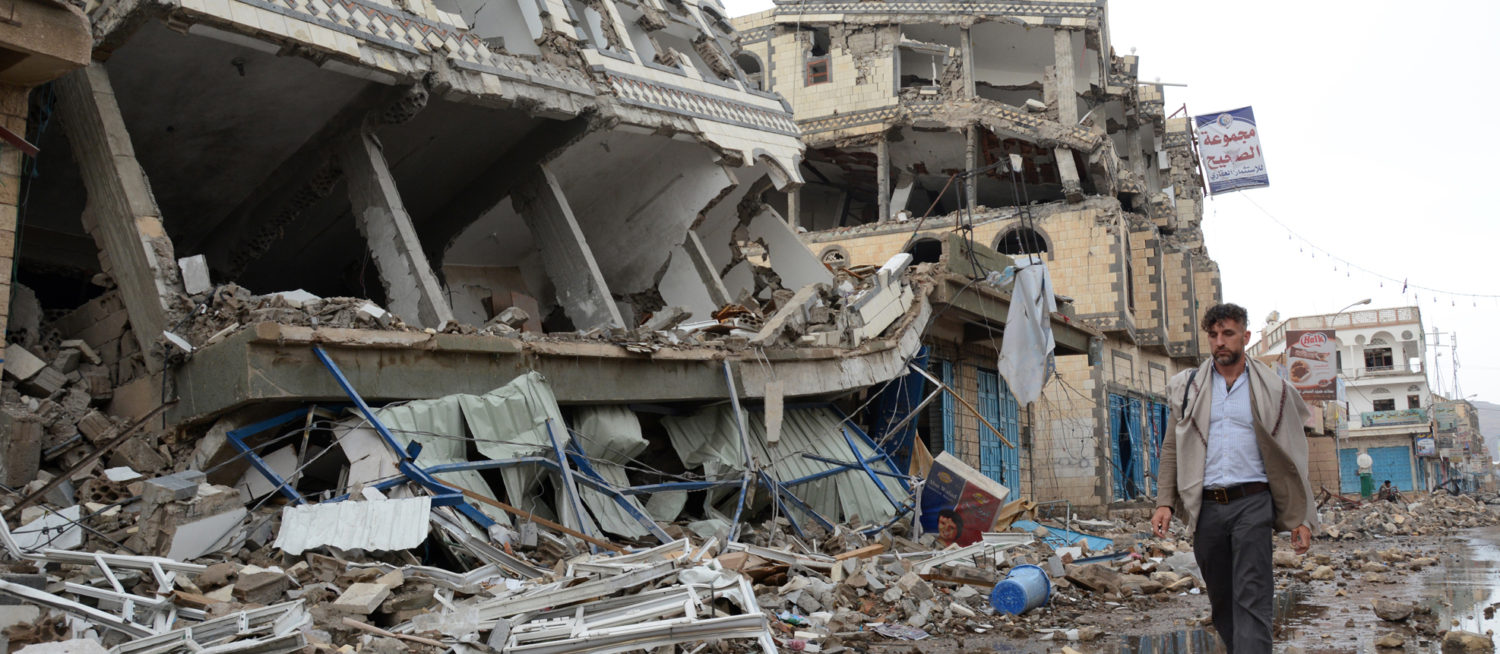Moving forward
The UK’s seat at the UN Security Council represents an opportunity to form the basis for negotiations between the two most prominent Yemeni parties to help end the conflict but one which has not yet been seized. Helen Lackner discusses.
Earlier this month, the war in Yemen made one of its rare appearances in the world’s news headlines. A Saudi–led coalition air strike hit a bus full of young boys returning from a religious summer school to their homes in Saada governorate, the heartland of the Huthi movement. Forty boys died as well as 11 adults, on the bus or passers-by in the market where the strike happened. Most massacres of civilians are ‘investigated’ by the coalition itself – hardly independent – and months, even years, after the event, claim that there was a military target in the neighbourhood and the strike had been a mistake. Not this time: the spokesman for the coalition immediately asserted that this was a ‘legitimate military target’. A few days later, a CNN investigation on the ground found that the ‘weapon that left dozens of children dead on August 9 was a 500-pound (227 kilogram) laser-guided MK 82 bomb made by Lockheed Martin’ demonstrating US complicity in the war. While in this case, no direct British involvement has been proven, Britain continues to sell weapons to the two main coalition states, Saudi Arabia and the United Arab Emirates.
The war, now well into its fourth year, is a complex convergence of struggles whose synergy has contributed to the country achieving the undesirable record of being the world’s worst humanitarian crisis: more than 75 per cent of the population are in need of emergency assistance. Internally, there is a civil war involving a number of parties: the ‘internationally recognised government’ of president Hadi who became president as part of the transition process following the major popular uprisings of 2011, and its internationally recognised opponents, the Huthi movement, also known as Ansar Allah, which has controlled the capital Sana’a since early 2015 and continues to control the majority of the country’s densely populated northern highlands. Until the Huthis killed ex-president Saleh last December, they were allied with the General People’s Congress, Yemen’s largest political organisation. The Hadi government, most of whose members spend much time in Riyadh, includes the second largest party, Islah (a tribal-Islamist formation) as well as other political organisations.
The UK retains a major role in the Yemen conflict in different ways: it is a significant contributor of humanitarian funding. Politically, at the UN, its seat as a permanent member of the United Nations Security Council (UNSC) has entitled it to the position of pen-holder for the Yemen file. Despite stated concern about the fate of Yemenis and the disastrous humanitarian situation, the UK has not yet done the one thing which could help bring at least the international aspects of this war to an end: namely, submit a new resolution which would enable the recently appointed UN Special Envoy, a British citizen, to bring the conflicting parties to the negotiating table. As representative of the UN Secretary General, he can only act within the framework of relevant UNSC resolutions, and particularly resolution 2216. Voted on in April 2015, it both endorses the continued presidency of Abdo Rabbo Mansour Hadi (his term officially ended in 2014), and the military intervention of the Saudi-led coalition.
In practice, this means that it both justifies Saudi-led coalition actions and demands the effective surrender of the Huthi movement. This explains why Saudi Arabia rejects any change and why it is completely unacceptable to the Huthi movement who are in control of the lives – as well as suffering and death – of the majority of Yemenis.
The UK’s seat at the UNSC represents a significant opportunity to form the basis for real negotiations between the two most prominent Yemeni parties but one which has not yet been seized. Why is this? Is it to ensure continued Gulf Cooperation Council investment in Britain post-Brexit? Or continued profitable arms sales? Since the Saudi-led intervention started in March 2015, the UK has licensed more than £4.6bn in arms sales to the country, including £2.7bn of aircraft, drones and the like and £1.9bn of ammunition (grenades, bombs, missiles etc.).
Labour has been loud and clear in criticising arms sales to Saudi Arabia. Addressing prime minister’s questions in March, Jeremy Corbyn said “Britain has not only increased arms supplies to Saudi Arabia dramatically since the start of the war, not only supports the war, as Theresa May said in the chamber just now, but British military personnel advise the Saudi air force and military on targeting – and so there is a direct involvement in the conduct of the war.” But the party has said little about similar sales to the United Arab Emirates which is also a leader in this coalition.
Labour calls for humanitarian assistance to Yemenis and protests at outrages such as the bombing of children, schools, hospitals, weddings and funerals. It calls for a political solution. It could also more helpfully focus attention on the UK’s lack of initiative at the UNSC, and address other problems which concern Yemenis on a daily basis, such as the near-impossibility for Yemenis to obtain visas for any reason, thus closing the door to potential refugees as well as students or others.

